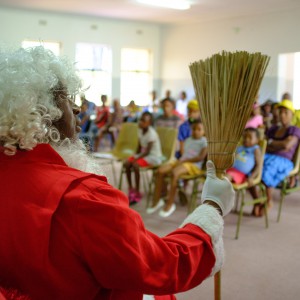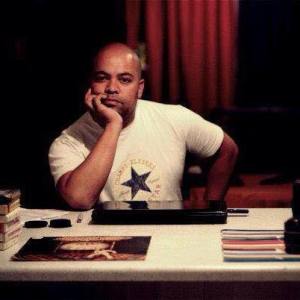“Just to hear the sound of someone from our mixed-race culture on radio”
South Africa was one of the last countries in the world to introduce television to its people in 1976 – 40 years after pioneers like UK or Germany and even 20 years after Finland. The reasons for the delay seem entirely crazy. Then again, they are very much in line with the apartheid era. However, from radio’s perspective the late introduction of television bears great stories and memories.
Photographer Mike Abrahams, a colleague of ours from Westbury Youth Centre, lived his childhood in the 70’s Johannesburg. In his memories radio was the top, the only, the most exciting entertainment media available. The stories cling to many European memories from the 50’s. So, what was the place and role of radio in a coloured boy’s life in the 70’s Joburg? What happened when TV came? How did radio change? Did it vanish? Way no. Something much better was to come, even under the apartheid rule.
Photo: Mike Abrahams michaelabrahamsfot.wix.com/michaelabrahamsfoto
****************
The clips from the topmost legendary South African Radio Drama, Squad Cars, are a courtesy of Sonovision Studios and SABC.
The clip from the Kofifi FM broadcast on the 19th of November 2014 at 11h30, as well as the jingles framing it, are attached to the interview with the permission of Kofifi FM. Thank you for cooperation, Kofifi CEO Joseph Cotty and sound engineer Ralton Seegels.
More info on the legendary Squad Cars is available e.g. in the abundant Internet Archive. Enjoy!
For a more detailed analysis on South Africa pushing the introduction of TV till 1976 check e.g. Bernard Cros’ article in ORACLE.
For stories of the first decades of South African TV check e.g. Carin Bevan’s free thesis.
“Bring back this culture of radio dramas!”
Coco Merckel is a renowned South-African performer, writer, producer and director. Graduated from FUBA (Federated Union of Black Artists), he has been professionally hyperactive in the theatre, film and television as well as in community and corporate theatre fields for 22 years. In theatre he is best known for his critically acclaimed one-man show “No Room for Squares”. In TV his role as Witboy in the sitcom “Suburban Bliss” won him a nomination for an Artes Award for best actor in a comedy. In community theatre Coco tours as a field worker locally and internationally for the Market Theatre Laboratory.
Born in Westbury Johannesburg, Coco has settled one of his community theatre projects in Westbury Youth Centre. The project, created and run together with Esmeralda Bihl, a renowned actress born in the Westbury-neighbouring Newclare, trains the drama group of WYC on how to develop, write and perform a radio drama. The changes are there! They’re here. They’re tactile. The WYC drama group is bringing radio drama back to local radio stations. The students write and produce drama series on issues true in their lives and raised during their research sessions in Westbury and its neighboring communities. They are changing themselves and their communities. No exaggeration here. Just a big hand to Coco and Esmeralda. And a small, equally true one for WYC Radio device donators.
Each series of the “I Am Awe-Ness Productions'” radio dramas has five episodes. The first of the series “It only takes one line” focuses on substance abuse. It is broadcasted in partnership with Eldos FM as well as in WYC Radio SoundCloud. The first airing on Eldos FM was on 25th October 2014, and the series will be broadcasted again in the beginning of November.
The next series? Soon.
Listen to a man passionate in radio drama and convinced in its power. Listen to his students in action. He’s crazy, yes. It’s all true.
Photo of the recording of “It only takes one line” by I am Awe-Ness Productions: Matias Harju
“The world is not full of new journalists, the world is full of people who have access to Facebook”
Paula Salovaara is one of the key actors in the Finnish radio scene. She has been involved in numerous radio changes since 1980’s, among them a legend: the first remarkable private urban radio station Radio City. In the year 2000 she shaked the Finnish radio scene by putting up her own work of art: Radio Helsinki. It’s one of the pioneers of Internet radio in Finland and nowadays a renowned local music and talk FM radio. With the concept of no playlist, tens of professional dj’s and long discussion programs Radio Helsinki was said to never be able to succeed for more than a year. On the 1st of September 2014 the urban dream just celebrated its 14 year anniversary. The times are hard. So are the workers on the little legendary channel. Looking back to the year 2000: why did Paula Salovaara want to put up something as crazy as an own radio station?
Photo: Paula Salovaara with Njassa and Sami Yaffa
“Yö olisi kuunnelmien aikaa”
Tiina Luoma on äänisuunnittelija Yleisradion Radioteatterissa. On hivenen väkivaltaista haarukoida tiskiin parhaita teoksia yli 26 vuoden uralta. Järjen uhalla: Luoma on saanut mm. Special Prix Europa -palkinnon vuonna 2010 kuunnelmasta Varjoinen talo ja erityisen Prix Europa -maininnan vuonna 2013 kunnelmasta Wunderbar. Näissä vuoden 2014 teoksissa taikaa: Pimeän nimi, Valaskuunnelma ja Luotsikadun lapset. Mikä on kuunnelman paikka tässä nopeassa ajassa? Missä tehdään hyvää kuunnelmaa? Mikä oli paremmin vuonna 1988?
Kuva: Johannes Luoma


